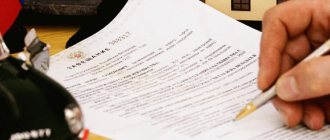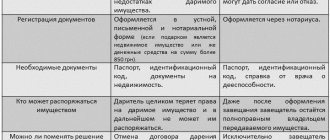Property legally owned by the owner can be transferred to third parties as an inheritance. This can be done by order of succession or on the basis of a will. A document prescribing the transfer of ownership rights to certain persons has legal effect, regardless of the circumstances under which it was drawn up. To avoid problems when registering an inheritance, you need to know how to write a will without a notary, the sample of which is not fixed.
Why do you need a will?
A will is a written document that allows a person to legally determine how his or her property will be disposed of after death. The act of expression of will comes into effect after the opening of the inheritance. Issues of its writing and execution are regulated by the Civil Code.
If a will is not drawn up, then the property passes to the heirs in the manner prescribed by law. This means that they receive inherited property in equal shares according to the established order.
Ignoring the procedure for drawing up such an order can result in problems for the relatives of the deceased.
A will is drawn up for the purpose of:
- Determine the circle of persons (relatives or not) who will receive the inheritance after the death of the testator.
- Specify the list of property due to heirs.
- Establish the share of each of the applicants in the total inheritance.
- Outline the conditions for receiving an inheritance.
In general, the law requires mandatory notarization, otherwise the act of expression of will is considered invalid. The notary’s task is to verify the testator’s legal capacity and compliance of the terms of the document with Russian legislation. But there are exceptions. They arise in special conditions when it is necessary to ensure the exercise of the rights of a capable person to determine his will regarding the disposal of his property after death, and the opportunity to do this with the participation of a notary is limited.
Wills are divided:
- certified by a notary;
- equivalent to notarized;
- drawn up without the participation of a notary.
Fulfilling the requirements for drawing up a testamentary disposition will allow you to avoid troubles associated with recognition of its validity. You should learn in advance how to draw up a document correctly.
Description of the document
A will is a legal document that sets out how ownership of items that belonged to the deceased will be transferred to other persons. They can be either close relatives or citizens who are not related to the deceased. The main condition in this case is the mention of the person in the paper.
Unlike inheritance by law, in a will a citizen can independently determine to whom his property will be transferred after death. There are open and closed documents.
In the first case, the composition of the paper is revealed immediately. In the second - only after the death of the testator. The law does not indicate that a will must be drawn up. Drawing up paperwork is a voluntary decision of a citizen.
Who can be a testator
All individuals of social maturity can bequeath personal property. For this, a person must be:
- Adult. Minor citizens have the right to make a will from the moment of marriage or emancipation (declaring the minor legally competent). The latter is carried out by decision of the guardianship and trusteeship authorities for a child over 16 years old who works under an agreement, contract or is engaged in business.
- Capable. The legal basis for recognizing incapacity can only be a court decision. You can doubt a person’s capacity based on indirect signs (for example, incoherent speech, trembling of hands, obvious absurdity of the content of the document). If it turns out that a person, being legally capable, at the time of writing the act of expression of will was not able to control and regulate his actions, then the legality of the document can also be challenged.
Recognition of a citizen as incompetent or partially capable after the fact of making a will does not affect the result of assessing its validity.
Is it possible to make a will without a notary?
It is possible to write a will without a notary that will be legally valid in cases regulated in the Civil Code:
- When making closed testamentary dispositions. Closed wills are understood as wills that testators draw up personally without the presence of strangers in secrecy. They are drawn up in handwritten form; the use of printed media is not acceptable. Such a document in a single copy, sealed in an envelope, in the presence of two witnesses, is handed over to a notary for safekeeping. All responsibility for the correctness and literacy of the content falls on the testator.
- There is no notary at the testator's location. This situation is typical for small settlements where notary offices are not organized, as well as places of military service and prisons. The list includes vessels at sea and areas where exploration expeditions are being conducted.
- There is an increased threat to the life of the testator. Finding a person in the epicenter of natural disasters and military operations poses a serious risk. In such circumstances, it is possible to draw up papers without the participation of a notary.
- The physical capabilities of a citizen who wishes to make arrangements in the event of death are limited. A document drawn up while a person is in a medical institution, nursing home, or sanatorium has legal force.
- It is assumed that one or more bank deposits will be inherited. A testamentary disposition regarding the inheritance of funds is drawn up in the bank where they are deposited.
In the absence of a notary in the above circumstances, documents certified by authorized persons are considered legal.
Who can certify a will?
The norms of the Civil Code of the Russian Federation clearly list the entities that can certify wills. This gives acts of will a legitimate status.
Depending on the situation, the persons certifying the will are:
- heads of local government bodies, specialists of the compulsory health insurance service (CHI) - in settlements where there is no notary office;
- chief doctors, their deputies, performing duties under the relevant order, doctors on duty - in hospitals and other medical institutions;
- directors, doctors on duty - in boarding schools, nursing homes;
- captains - on Russian ships;
- commanders of military units;
- heads of places of serving sentences;
- heads of field bases and expeditions;
- authorized employees - in banking institutions;
- when drawing up an administrative act in force majeure conditions, it will be witnessed by two people chosen by the testator at random.
Documents certified by the listed entities will be valid if the testator was in the specified place at the time of their execution.
Drawing up a will without a notary
When drawing up a will without notarization, no form is required. It is enough to adhere to the requirements:
- the document is drawn up manually or on a computer;
- the testator writes the text independently or his instructions are recorded by an authorized official;
- if the document is drawn up according to the words of the testator, then the latter must read it before signing;
- if the will-maker does not have the opportunity to personally read the text, then the official reads the document out loud.
The testator has the right to amend or cancel the act of expression of his will, drawn up without a notary.
Documents to be drawn up
To correctly draw up a testamentary disposition, the following is required:
- testator's identity card;
- list of subjects - intended successors of the inheritance estate.
The execution of wills without the participation and certification of notaries can be carried out in the absence of title documents for the property. It is enough to provide the wording in the text: “I bequeath all movable and immovable property that will belong to me on the day of death.”
When registering a document, you do not need to pay a state fee. Typically, material costs consist of the cost of notary services for its registration (from 1,000 rubles/page) and certification (from 100 rubles). Any attempt by authorized persons to collect fees is illegal.
Form
All such documents, in order for them to acquire legal force, must be in writing. This especially applies to the inheritance of real estate, apartments, securities, and cars. Personal belongings, household items, and small amounts of money can be transferred by verbal agreement.
Using a sample to write a will without the participation of a notary will help eliminate errors in the execution.
Compilation rules
In order to avoid conflict situations between successors, the type of will in question is drawn up according to the following mandatory rules:
- The document provides the necessary details.
- The text must be clearly formulated and reflect in detail the last will of the person.
- Errors and typos are not allowed.
The likelihood that a correctly executed document will not be recognized is low.
Content
Wills without notarization include:
- name of the document being drawn up;
- information about the place and date of registration (in words);
- in full - last name, first name, patronymic of the testator;
- accurate information about the composition of the inheritance mass;
- reliable information about the intended successors;
- number of issued copies;
- a record that the document was drawn up personally by the testator without coercion;
- signatures of the testator, witness and two witnesses.
The execution of wills for apartments without notary services does not differ in form and the presence of mandatory details from will documents regarding other valuable property. There must be information about the exact address of the property, its area and the number of rooms to be inherited. Indicate what part of the property goes to each of the receivers.
The need to know the laws
To correctly draw up a will for an apartment or other property, you need to remember that this document is a transaction. He must not break the law. When drafting it, it is important to comply with legal literacy.
You should know that there are heirs who, according to the law, will receive part of the property without fail. In order for one person to receive property, an officially written waiver of shares by other heirs is needed. Otherwise, relatives who have the right to inheritance will try to challenge the will.
Special cases
There are situations in which a special procedure is required for drawing up and authenticating a document containing a person’s last will. These include life-critical situations and the management of money stored in a bank account.
Bequest of funds deposited in a bank
To express the will regarding the inheritance of money stored in the bank, the testator should draw up an order in the branch where the deposit(s) was opened. The bank is obliged to accept wills free of charge.
A document drawn up at a bank institution will have legal force if it is drawn up and certified in the following way:
- the will is drawn up in two copies, each of which is signed by the testator and an authorized bank employee, certified by their seal;
- The order is certified only by the representative of the bank who has the rights to accept for execution the client’s will in relation to the funds in his account;
- one of the copies is transferred to the testator of the funds, the second is registered in the Book of Testamentary Dispositions and filed in a folder for storage.
If the will in the bank is drawn up correctly, it acquires the force of a notarized document.
Will in critical situations
Registration of the last expression of will of people who are in the epicenter of force majeure situations must occur upon fulfillment of the requirements noted in Article 1129 of the Civil Code of the Russian Federation:
- The text of the document is written by hand;
- The registration procedure is carried out in the presence of two witnesses.
If the testator survived in the conditions under consideration, then he needs to notarize the written order within 30 days after its end. Otherwise it is considered invalid.
Alternative options
The legislation of the Russian Federation establishes 2 methods of inheriting property:
- by will;
- in law.
If there is no will, then the property is transferred to the heirs, distributed in turn, taking into account the degree of relationship. A will allows the owner of the property to determine the heirs, regardless of family ties.
Attention. In emergency situations and the above circumstances, a will without a notary is the only option. The only way to avoid such a need is to draw up a document with a notary in advance, without waiting for special conditions.
In some cases, a will without a notary has legal force. It can be certified by persons whose powers are established by the Law of the Russian Federation. If a person’s life is threatened, a document is drawn up in the presence of witnesses. The legality of drawing up a document requires judicial confirmation of the fact of an emergency.
A correctly executed will without a notary has the same legal force as a notarized will. It can only be challenged through court.
What wills are equivalent to notarized wills?
Article 1127 of the Civil Code of the Russian Federation and comments to it define 5 types of wills that are equivalent to certified ones. The testator draws up such an act in person with the obligatory presence of witnesses, as well as authorized persons of the witnesses.
Wills equivalent to those certified by a notary:
- compiled while staying at a hospital inpatient facility, as well as in a nursing home: certified by the head physician, manager, deputy, doctor on duty;
- when sailing on a ship of the Russian Federation: certified by the captain;
- expeditions for various purposes: signed by the leader;
- a military person or a civilian located in a military unit: certified by its commander;
- convicts serving a sentence: signed by the head of the correctional institution.
A testamentary document executed in one of the indicated ways is signed in the presence of a certifying representative, a witness and a witness. At the earliest opportunity, the certifier submits the document to the notary authorities. Optimally - preferably at the place of residence of the testator.
In accordance with Art. 1127 of the Civil Code of the Russian Federation, the following documents cannot be certified by the listed methods:
- inheritance agreement;
- joint testamentary disposition of the spouses.
If the testator expresses a desire to invite a notary to certify his will, then the authorized person, if possible, is obliged to do this.
Entry into inheritance under an uncertified will
A testamentary disposition not certified by a notary or authorized persons has legal force in the case where the execution took place in extreme, life-threatening circumstances (military actions or natural disasters) in which the death of the testator occurred. Entry into inheritance under such an act can take place in one of the following ways:
- without a trial, when all heirs agree with the will of the deceased;
- through a lawsuit if the heirs have doubts about the authenticity of the document.
In case of a controversial situation, the heirs must prove the following facts in court:
- when writing a testamentary disposition, there were extraordinary conditions that limited the opportunity to resort to the services of a notary;
- the testator personally wrote the will without any pressure on him.
In the future, entry into inheritance by testamentary disposition, the authenticity of which has been confirmed in court, occurs on a general basis.
In all other conditions, except those considered, a document drawn up in handwritten form and not notarized has no legal force.
Are witnesses needed?
The issue of the presence of witnesses is always controversial. Their presence is a prerequisite, but only in some cases. A will has the right to be drawn up without the presence of unauthorized persons.
A closed will is the most complex legal procedure for transferring a certain benefit.
A closed will is written without witnesses. The will of a person remains a secret. The notary and witnesses do not have the right to demand disclosure of the secret of the document. The only requirement is that the sealed document must be handed over in the presence of witnesses: at least two people.
An emergency is also a controversial issue for establishing the authenticity of a document. If a person does not have the opportunity to draw up an agreement in the presence of a lawyer, he has the right to write his will by hand. The assurance takes place in front of witnesses—the only available perspective under the circumstances.
An authorized person, if the contract is drawn up outside the testator’s home, replaces the witnesses. On a ship, a person is not required to look for witnesses.
Period of validity of the declaration of will
A properly executed testamentary instrument becomes valid after the death of the testator. The following time characteristics are important for its implementation:
- The heir, within 6 months from the day following the day of death of the testator, may decide to enter into the inheritance or refuse it.
- If the six-month period is missed for valid reasons, the heir can restore it within 3 years. This period is counted from the moment when the heir no longer has a reason preventing him from assuming inheritance rights earlier.
The last will of the deceased, drawn up in the form of a will, including without its certification by a notary, has no limitation on the validity period.
General provisions
Every adult capable citizen has the right to dispose of property as he sees fit. Including deciding who should have it after his death. The main thing is that the will of the testator is voluntary, and he is aware of the meaning of his actions.
The only requirement for the testator is his full legal capacity at the time of signing the document. No other restrictions (for example, imprisonment by a court decision) are an obstacle to the disposal of property. A will can specify one or more heirs. However, drawing up a collective will is not allowed - only one person can be the author of the document. It is also possible to draw up a joint will.
If two or more persons are indicated in the will, and the testator has not expressed his will regarding the shares going to them, the property is divided in equal proportions.
Expert commentary
Kireev Maxim
Lawyer
When a will is drawn up without the participation of a notary, it must be handwritten by the testator personally. A document printed in any way (on a typewriter or on a printer) has no legal force. It is also not allowed to make a will through a representative.
Challenging a self-executed will
A will, regardless of whether it was drawn up independently or with the participation of a notary, can be challenged. If citizens believe that there are grounds to recognize a document reflecting a person’s will as invalid, they have the right to go to court to provide evidence of this point of view.
Grounds for challenge
A self-executed document reflecting the wishes of the will-maker who has died can be challenged:
- according to the circumstances under which the testamentary disposition was drawn up and certified (for example, if the opportunity to contact a notary was not used);
- essentially - controversial positions in the text regarding the size and share of inherited property, the exclusion of someone from the number of heirs, and more.
It may be necessary to prove the fact that the person freely expressed his will in the will.
Extraordinary circumstances
A will without a notary is valid if it is drawn up in emergency conditions. The legislation does not stipulate which situations are considered emergencies. But experience has determined that these are special cases in which a person cannot come to a professional, and his life and health are in danger.
The reasons for such situations are not taken into account; attention is paid only to the presence of a problem and to the freedom of action of the testator (if he was forced to draw up a document, the court will invalidate it). A will without a notary is valid for only a month. If the person managed to survive, then he needs to go to a notary and have the paper certified, otherwise the order will be cancelled.
If a citizen has died, then the validity of the will is defended by the heirs of the deceased. To do this, you will have to prove the presence of emergency conditions that did not allow the deceased to contact the authorized service. The document must be drawn up only at your own request without outside pressure, which must also be confirmed.
If the judge recognizes the will of the testator as valid, then the division of property begins in the manner specified in the will. When the authenticity of the order is not proven, the assets are distributed according to the law.









